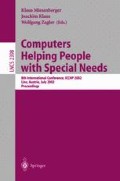Abstract
Courseware accommodations for individuals who are deaf are examined including translated and hearing video viewing preferences. Within a computer interface, two forms of translated educational video were provided: standard and acted. Think aloud protocol is carried out as part of a usability study of the courseware and its effectiveness as a method for ASL users is considered. There was no influence of translation type on participants’ performance on a comprehension test. Trends in the data suggest that individuals find the accommodations worthy of extra cost and are willing to shoulder some of this cost. Preliminary analysis of the verbal reports suggest that sufficient and rich data may be collected from ASL users in a TAP methodology.
Access this chapter
Tax calculation will be finalised at checkout
Purchases are for personal use only
Preview
Unable to display preview. Download preview PDF.
References
Benbunan-Fich, R.: Using Protocol Analysis to Evaluate the Usability of a Commercial Web Site: Information and Management (39) (2001) 151–163
Dumas, J. and Redish, J.: A Practical Guide to Usability Testing. Norwood, NJ: Ablex Publishing Co. (1994)
Ericsson, K.A. and Simon, H.A.: Protocol Analysis: Verbal Reports as Data: Massachus-setts, MIT Press (1984)
Green, A.: Verbal Protocol Analysis in Language Testing Research: a Handbook: University Press, Cambridge (1998)
Mack, R.L., Lewis, C.H. and Carroll, J.M.: Learning to Use Word Processors: Problems and Prospects. In: Baecker, R. and Buxton, W.A.S. (eds): Readings in Computer-Human Interaction: Morgan Kaufmann, California (1987)
Mayhew, D.J.: Usability Engineering Lifecycle: Morgan Kaufman, San Francisco (1999)
Nielsen, J.: Guerrilla HCI: Using Discount Usability Engineering to Penetrate the Intimidation Barrier. In: Bias, R.G., Mayhew, D.J. (eds): Cost Justifying Usability. Academic Press, Boston (1994) also available on the world wide web: http://www.useit.com/papers/guerrilla_hci.html
Norman, D. A.: The Design of Everyday Things. Doubleday, New York (1988)
Preece, J.: A Guide to Usability: Human Factors in Computing: Riverside, Great Britain (1993)
Schirmer, B.: Psychological, Social, and Educational Dimensions of Deafness. Allyn and Bacon, Massachusetts (2001), 61–96
Schirmer, B. and Woolsey, L.: Think Aloud During Reading with Students Who Are Deaf: Paper Presented at AERA, Montreal (1999)
Smagorinsky, P.: Thinking and Speech Protocol Analysis. In: Mind Culture and Activity 5(3) (1998) 157–177
Stewart, D.A., Schein, J.D., Cartwright, B.E.: Sign Language Interpreting: Exploring its Art and Science: Allyn and Bacon, Massachusetts (1998), 31–58
Web Accessibility Initiative: available on the worldwide web: http://www.w3.org/WAI/
Author information
Authors and Affiliations
Editor information
Editors and Affiliations
Rights and permissions
Copyright information
© 2002 Springer-Verlag Berlin Heidelberg
About this paper
Cite this paper
Roberts, V., Fels, D. (2002). Methods for Inclusion: Employing Think Aloud Protocol with Individuals Who Are Deaf. In: Miesenberger, K., Klaus, J., Zagler, W. (eds) Computers Helping People with Special Needs. ICCHP 2002. Lecture Notes in Computer Science, vol 2398. Springer, Berlin, Heidelberg. https://doi.org/10.1007/3-540-45491-8_60
Download citation
DOI: https://doi.org/10.1007/3-540-45491-8_60
Published:
Publisher Name: Springer, Berlin, Heidelberg
Print ISBN: 978-3-540-43904-2
Online ISBN: 978-3-540-45491-5
eBook Packages: Springer Book Archive

